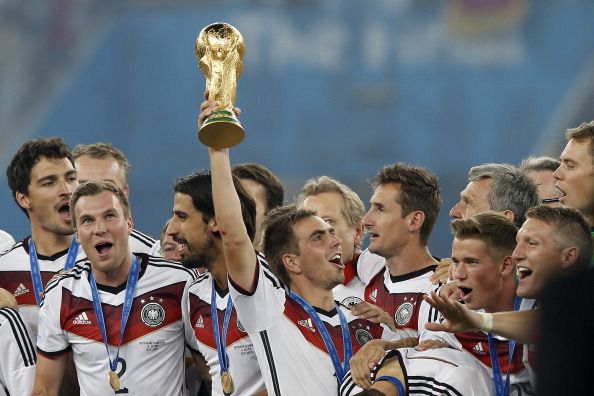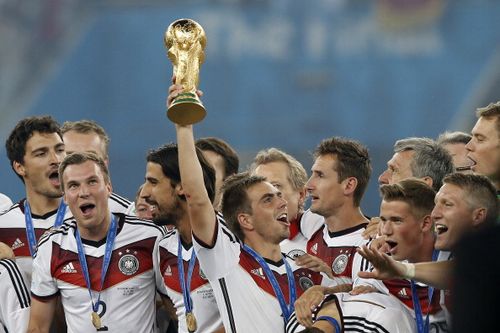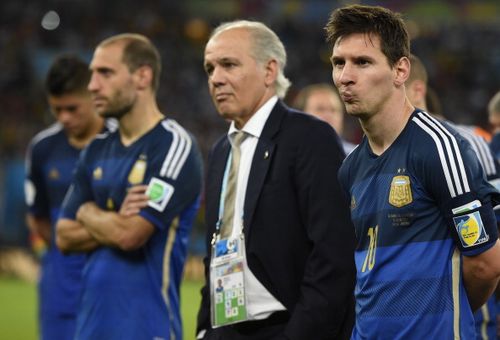
Afterthoughts on the 2014 World Cup Final

With the overall memories of the World Cup ready to fade away, the reminiscences of the final still reverberate. Couple of post-match scenes continue to linger. The one which involved the German players parading their exquisite WAGs on the pitch right in front of the crestfallen, sulking Argentineans, who were still trying to come to terms with the cruel defeat. The other, where a downcast Messi dragged himself up towards the dignitaries in the stands to collect the Golden Ball award. His shoulders drooping and head hung low, the misery of defeat quite palpable on his face as he stood utterly disconsolate next to Manuel Neuer with his personal accolade.
These two lasting post-match scenes, which probably would have drawn the sympathy of millions watching worldwide, remain etched in memory, along with of course the popular one of the Germans hauling the trophy overhead confetti rocketing from behind. From the German perspective, it is simple – Mario Goetze, their wonder boy scored the goal that won them the Cup, whereas for the Argentineans, it is a question of ‘what ifs’ and ‘if onlys.’
What if their strikers had been more clinical in front of goal, they would have been the ones rejoicing with their WAGs on the pitch and jumping with joy with the trophy. If only Higuan had shown more maturity in front of goal and not spurned the golden chance gifted to him by Kroos, the story would have been different. What if Messi’s shot had been a wee bit accurate and not drifted wide off the post just after the break. If only, Messi’s great dribbling run in the second half, where he curled the ball wide off the far post had curled a bit more and gone in. If only, Palacio, sporting a tuft of hair akin to an ISKCON devotee, had shown more devotion to the job at hand and controlled the ball better, his would have been the name on everyone’s lips, not Gotze’s.
No matter how hard they tried, Argentina just couldn’t shake off the German jinx that continues to haunt them. The Germans remain their nemesis for the third straight World Cup.
In spite of the scarcity of goals in normal time the final was a joy to watch. An end-to-end contest, it lived up to its billing as ‘the game’ of the tournament. Contrary to popular opinion, Germany did not dominate as expected. Argentina were better for large spells of the game and had the best opportunities to score.
A game decided by two tactical substitutions
Tactics define the modern game and the final turned to be one fine example of games won through tactics. If the introduction of the talented Goetze was the defining moment for Germany, a masterstroke by Loew, the German coach; Sabella, the Argentinean coach’s substitution of Lavezzi with Sergio Aguero at half time was an inexplicable blunder that perhaps weakened Argentina after the break.
Ordinary managers take note of a player’s reputation while employing them, whereas the best ones choose the one’s in form at that moment. For me, Lavezzi was the best player on the pitch before the break. He was directly involved in most of Argentina’s forays into the German penalty area in the first half, including delivering the cross that led to Higuan’s disallowed goal.
His relentless running, determination and industriousness kept the Germans on the edge. Yet, Sabella substituted him with Aguero, believing the latter’s reputation to deliver. For most parts of last season, Aguero was on the sidelines due to injuries and did not sparkle for his club Manchester City in the games he played. His selection was mostly on him being Sergio Aguero, than the way he was playing at present and that hurt Argentina.
The question of luck always surfaces in everything. If Italy were unlucky to lose Marchisio to a red card in the crucial group game against Uruguay, a decision which had a big say on that game, Germany were quite fortunate to not have their left back Howedes sent off for a cynical studs up challenge on Zabaleta. In fact, one or two pivotal refereeing decisions went Germany’s way, such as Neuer’s foul on Higuain in the penalty box, which could easily have been deemed to be a penalty on any other day.
What next for Argentina and Germany?
At the end of the day, it is the chances that Argentina fluffed that will haunt them more than refereeing decisions. They will now have to wait another four years to redeem themselves, which is quite a long time to wait and possibly unlikely, since age may catch up with some of their standout players, such as Mascherano, Zabaleta, Garay, Lavezzi and Messi, all of whom will be in their early thirties.

Conversely, the future is rosy for Germany. The majority of the present World Cup-winning squad will still be in their twenties when they arrive in Russia to defend their crown in 2018. It’s an irony that one of Germany’s most talented players, 25 years old Marco Reus, had to miss out on a World Cup winner’s medal due to injury. He certainly can be a force to reckon with for Germany in the next tourney. Taking the age and winning psyche of the German players into consideration, it wouldn’t be an exaggeration to say that, Germany may emulate Spain, and embark on a tournament winning spree from here on.
Hence, as we wait to see if this will happen or not, we can continue to cherish the memories of the most entertaining World Cup ever. The vibrancy of the colourful Brazilians, the diversity of their land, the stunning landscape of cities like Rio de Janeiro, the foot-thumping music, the World Cup songs and the hip jiggling dances of the feather-clad samba brigade will all be missed along with the salsa of the Columbian team and the hilarious buffoonery of the Ghanaian team, but not for long, after all in two years’ time, the world’s attention will shift again to the South American nation when Brazil hosts the 2016 Summer Olympics.